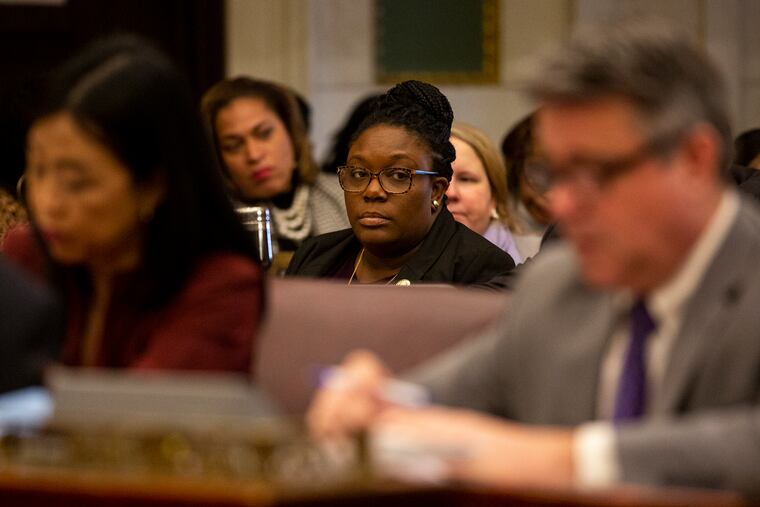Philly progressives who won big last year are making moves in City Council
A new Council kicked off its first working meeting with a wave of liberal proposals on issues such as housing, workers’ rights, and gun violence.

After an election marked by victories for progressives and upstarts and defeats for some longtime incumbents, a new Philadelphia City Council kicked off its first working meeting Thursday with a series of liberal proposals on issues such as housing, workers’ rights, and gun violence.
Freshman Councilmember Kendra Brooks of the Working Families Party called for hearings on whether Philadelphia should adopt a rent control system, kicking off what is sure to be a heated debate. Councilmember Bobby Henon proposed requiring businesses to provide employees with paid leave for family medical emergencies. And Henon joined Councilmember Helen Gym in a proposal to create a permanent Department of Labor to enforce worker-protection rules.
“That’s what we ran on,” said Brooks, the first Council member from outside the two major parties in more than a century. “We have to get started immediately, and we’re ready.”
Gym said progressives feel urgency to pass legislation as the broader political climate has encouraged activists to focus on local issues.
“Now more than ever," Gym said, “people feel like local politics is where we can effect the most amount of change right now, when a lot of state-level and congressional-level politics has stagnated.”
Henon had previously proposed establishing a permanent city department for protecting workers, a task now handled by a mayoral office. But he said he believes the measure will fare better this year.
“I think the timing is perfect for it, not just with this Council but with the policies that we’re going to be tackling here,” Henon said.
Council in recent years has passed several significant worker-protection measures, including ones that have put Philadelphia on the front lines of progressive policy-making across the country.
Some of the new proposals are sure to meet with skepticism from more moderate members of Council, and from the business community, which has been attempting to reboot its political strategy and gain more influence in City Hall.
Councilmember Allan Domb, for instance, said the problem for Philadelphians struggling to stay in their homes is not that rents are too high but that incomes are too low.
“Do we have a cost problem or do we have an income problem?” Domb said. “How do we improve the annual incomes of people in the city? ... The other issues are a symptom of that.”
Combating gun violence has long been on Council’s agenda, but it’s taken on new urgency as last year’s spike in shootings and homicides has continued in the new year.
Council President Darrell L. Clarke on Thursday proposed suing Pennsylvania to allow cities to regulate guns, which courts in the past have ruled is the sole domain of more firearms-friendly state lawmakers in Harrisburg. He introduced a resolution Thursday allowing Council to hire lawyers to begin the case. Every member cosponsored the measure except the body’s two Republicans, David Oh and Brian O’Neill.
The city has failed in previous attempts to gain the authority to regulate guns. This time, the city will pursue a legal strategy of framing gun violence as a public health crisis, instead of simply challenging language in state law known as the preemption clause that restricts firearm regulation to Harrisburg, Clarke said.
“People in Philadelphia are tired and frustrated with gun violence happening every day in their neighborhoods,” Clarke said. “Desperate times call for desperate measures.”
Lawmakers also introduced a number of bills that either failed to pass in the previous session or were shot down by Mayor Jim Kenney.
Kenney in December killed six bills after Council adjourned for the year by letting them expire, a maneuver known as a pocket veto. The move blindsided and angered Council members.
Four of the bills were authored by members returning to Council this year, and of those, three were reintroduced Thursday: a Clarke proposal to require developers to negotiate community benefits agreements with neighborhood groups, a measure by Domb to give poor Philadelphians a partial refund from the city wage tax, and a bill by Councilmember Kenyatta Johnson to increase the homestead exemption for property taxes.
Domb on Thursday also introduced legislation that could limit members to serving no more than four four-year terms. There are currently no Council term limits, and the longest-serving member, O’Neill, has been in office since 1980.
Domb previously pushed unsuccessfully for a measure limiting members to three terms. He hopes his latest proposal, which would also exempt all current members, will make it easier to win approval from his colleagues and from voters, who would also have to approve the change to the city’s Home Rule Charter in a referendum.
“Four terms is something that’s not hard to say yes to,” he said.